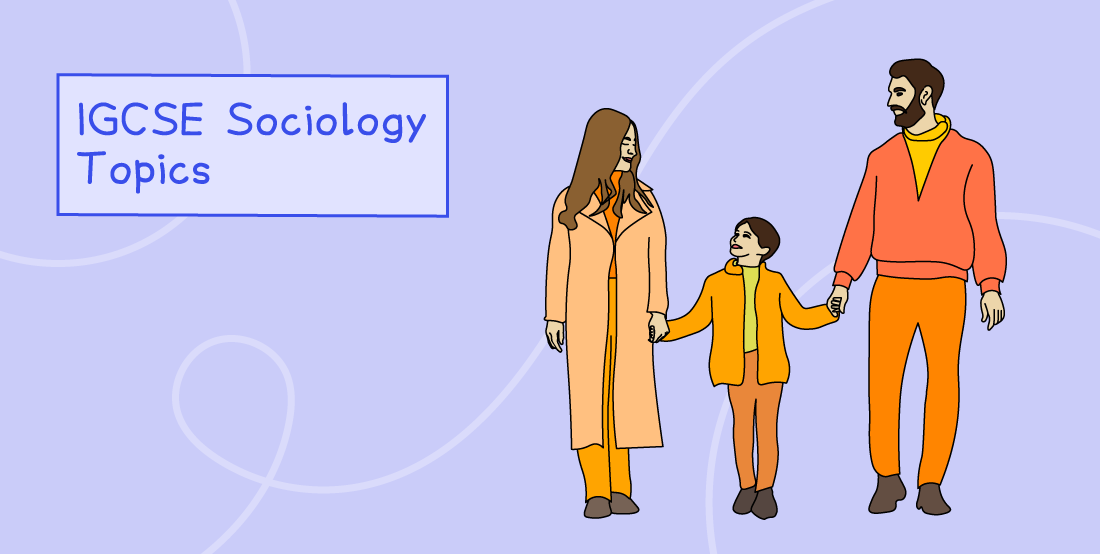IGCSE Sociology Topics by Exam Board: Full List
Written by: Raj Bonsor
Reviewed by: Claire Neeson
Published

As an IGCSE Sociology student, finding the information you need about the exam board you are studying can be challenging. This article provides a detailed breakdown of the IGCSE Sociology topics covered by the Cambridge exam board. This way, you will know exactly what to learn and where to look for the best exam board specific revision materials.
Cambridge IGCSE Sociology Topics
Cambridge IGCSE Sociology is divided into 6 topics.
1. Research Methods
This topic explores how sociologists investigate society using different approaches and tools.
You’ll explore the positivist and interpretivist perspectives. You will learn how they differ in their views and the types of data they prefer to collect. You’ll also learn how to design a research project, including choosing a topic, selecting a sample, and deciding on the best methods to use.
Topics include:
Positivism vs interpretivism
Quantitative and qualitative sources of data
Analysis, interpretation and evaluation of data
Research design
Sampling methods
Theoretical, practical and ethical issues affecting research
2. Identity: Self and Society
Identity: Self and Society examines the ways in which society shapes who we are and how we form our sense of identity.
You’ll explore how culture, norms, values, and roles influence the way individuals behave and see themselves. You’ll examine how primary and secondary socialisation help form identity through agencies like the family, education, peer groups, media, and religion. You’ll also learn how society tries to control behaviour through formal and informal social control.
Topics include:
Identity as a social construction
Theories on socialisation
Agencies of social control
The digital self and online identities
3. Social Stratification and Inequality
Social Stratification and Inequality explores how societies are divided into layers and how this affects people’s opportunities and life chances.
You’ll explore the difference between open and closed societies and how factors like age, gender, ethnicity, and social class can shape inequality. You will study different sociological theories, such as Marxism and labelling theory, to explain why inequality exists. You’ll also examine how governments, welfare systems, NGOs, and globalisation attempt to reduce inequalities and how successful these efforts have been.
Topics include:
Life chances
Sociological theories on social inequality
Legislation designed to reduce inequality
The impact of globalisation on social inequality
4. Family (Optional Topic)
The family topic explores the different types of families that exist today. These include nuclear, extended, lone-parent, and reconstituted families.The topic also looks at alternative family forms and types of marriage.
You’ll explore how family life varies by culture, social class, and ethnicity and how sociologists view these changes. You will study how functionalist, Marxist, and feminist perspectives explain the role of the family in society. You will also examine how family life is changing over time due to factors like demographic shifts, laws, values, and gender roles.
Topics include:
Different family structures
Sociological views on family diversity
Sociological theories on the role of the family
How family life is changing
5. Education (Optional Topic)
In this topic, you will learn about the role of education in society and how it influences individuals.
You’ll explore the differences between formal and informal education, including what is taught through the official curriculum and the hidden curriculum. You will study how functionalist, Marxist, and feminist perspectives view education. You will also examine the reasons behind differences in educational achievement based on social class, ethnicity, and gender.
Topics include:
Formal and informal education
Different types of schooling
Sociological theories on the roles and functions of education
Explanations for differences in educational achievement
6. Crime, Deviance and Social Control (Optional Topic)
This topic explores what crime and deviance are and how their meanings can vary across different societies, cultures, and time periods.
You’ll explore how individuals are controlled through formal social control (e.g., police, courts) and informal social control (e.g., family, media). You will study the different types of crime, including white-collar, cyber, and gang crime, and learn how crime is measured using statistics. You will also examine why different groups in society may commit or experience crime.
Topics include:
Formal and informal agencies of social control
Explanations for crime and deviance
Sociological theories on crime and deviance
The effectiveness of punishment, policing and law enforcement
What is Covered in Cambridge IGCSE Psychology Papers 1 & 2?
Cambridge IGCSE Sociology | |
Paper 1 50% of your final mark | Paper 2 50% of your final mark |
Topics 1-3 Students must study all topics:
| Topics 4-6 Students must study any two topics:
|
| |
Use the Cambridge IGCSE Sociology Past Papers to support your exam preparation.
Improve Your Grades with Save My Exams
Here at Save My Exams, we develop high-quality, affordable revision resources that will help you study effectively and get the most out of your revision. Our revision resources are written by teachers and examiners. That means notes, questions by topic, and worked solutions that show exactly what the examiners are looking for.
Explore our sociology resources to kick-start your journey to exam success.
References
Cambridge University Press & Assessment (2024) Cambridge IGCSE™ Sociology 0495, Version 3: https://www.cambridgeinternational.org/Images/662464-2025-2027-syllabus.pdf Accessed 21 March 2025
Sign up for articles sent directly to your inbox
Receive news, articles and guides directly from our team of experts.

Share this article


 written revision resources that improve your
written revision resources that improve your